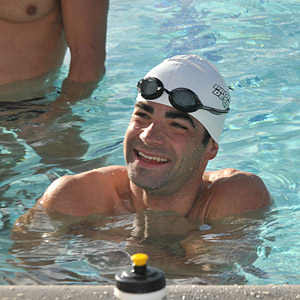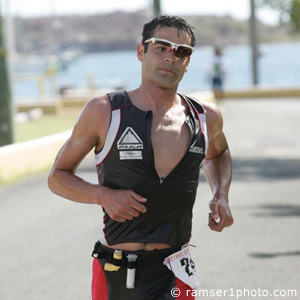Timothy O’Donnell story – Part 2
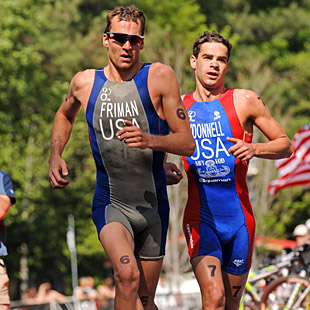
Timothy O’Donnell achieved great success as a collegiate and elite military triathlete. But when his less than elite run became an impassable roadblock to ITU short course racing medals and to his Olympic chances in 2008, he faced a tough choice. Many people, including his loving and supportive parents and some national team coaches included, told him he was beating his head into the wall and his future in triathlon likely had a ceiling to it. But coach Cliff English, a Navy supervising officer and his own stubborn persistence led O’Donnell to abandon the safety net of a Navy career and embrace the longshot risks of a professional triathlon career.
Part 2 of 3 covers O’Donnell’s chase for ITU world points, an excursion into team tactics racing, some signposts of future success and a tough decision to quit the Navy after his five-year obligation was up.
Chasing Olympic Trials
Slowtwitch: What was your focus during your 2004-2008 stunt within the USA Triathlon national squad while you were serving your five-year post-grad Navy obligation?
Timothy O’Donnell: When I look back, part of me was trying to make Olympic trials. But I went about it the hard way. From 2005 through 2008, I was fully dedicated to the ITU. I was racing all over the place — central America and South Africa and all over Europe. I raced every continent but Antarctica. It was very tough and I did what I needed to do to get the points to make trials. But it wasn't what I needed to do to develop.
ST: You were making progress. You won the National Military championship six straight times, you won Under 23 Nationals and you were the leading US Naval Academy triathlete winning two team titles at Collegiate Nationals and you placed second individual overall as a senior. But you feel you lacked a consistent overall program to rise to the level of the top pros?
Timothy: While at Colorado Springs, I linked up with then national team director Cliff English. He had confidence in me and never tried to define a limit to what I could do, which was great. We started working on my training and during this period, I had some small breakthroughs. At a race in Canada in ’05 I ran with Paul Tichelaar and that was big. I remember another race where I ran maybe a k with Hunter. That was big for me.
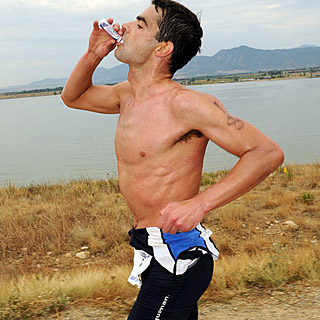
ST: That gave you a taste of where you needed to be?
Timothy: Honestly, I was in that same place until the beginning of last year. At the 2009 Pan American champs in Oklahoma City, I was running with Hunter. I thought: ‘Wow. He attacked.’ And he ran away. I look back and I think I could have given him more of a fight. But then I thought: ‘Wow, I was running with Hunter for 7 and a half K and he just attacked. I guess this is good enough.’
ST: From 2005 to 2008, what were your best Olympic distance run splits?
Timothy: I actually had a pretty good run at Worlds in Hamburg in 2007. .
Timothy: There was some good stuff on that run, especially after the bike. I was in a break with Olivier Marceau and I was the guy throwing attacks off the front. It's a fast course, but there were a lot of corners and there were a lot of accelerations that required real strength.
ST: You came up against the races of truth in ’08 – the Olympic Trials. .You were a longshot but you still must have held some hope?
Timothy: There were three trials races. I didn’t go to Beijing because I didn't have a high enough ITU ranking. So I went to round two in Tuscaloosa. I was very nervous and I didn’t have a great swim. I came out in front of Matty Reed but I had a slow transition and just missed the first pack. I got stuck in my wetsuit. Rookie mistake. And that was it. That's it. That little thing. Had I made the front pack, anything could have happened. I probably wouldn’t have outrun Matty. But I might have put myself in position to earn a spot at Des Moines. I rode hard there and I ran a good 5k. But then I just fell apart.
ST: Was there anything positive from your race at Des Moines?
Timothy: I did a solo breakaway for all the glory and got some great air time on NBC. Followed by an atrocious run.
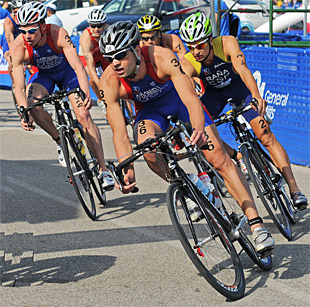
Team tactics
ST: I understand you took part in some experiments at team tactics during this time. How did they work out?
Timothy: Team tactics goes back to my time on Team Aegis with Vic Plata. When pro nationals was in Boston in ’05. I went on a break with Vic and Dave Reed, another Team Aegis guy. Dave and I pulled Vic around and Vic ended up second. Afterward, Vic gave me a free flight certificate. I thought that was cool. Then at the end of the year he gave me a call. ‘Hey do you want to join Team Aegis?’ I believe in team tactics. I personally have no problem going to the Olympics to help the US get a medal. And I think USAT knew that. That was my approach and I think I was the type of guy they were looking for – a reliable swimmer and a good biker willing to work for the team..
ST: It is a little like the Navy ethos?
Timothy: Yeah. The Navy has a motto: ‘Ship. Shipmate, Self.’ Because triathlon is such an individual sport, it’s hard to sacrifice your race for a teammate. But I could see the value in it.
ST: There are a lot of reasons why it might not work. But team tactics is an interesting and complex experiment. Can you ensure you will be close enough in an internationally top rate field to help and protect your point man?
Timothy: I got a good feel for it with Team Aegis and I helped out Matty at the 2008 ITU World Championship in Vancouver (where he finished 5th and gained important national Olympic qualifying points that ensured the US men had three Olympic spots). I was very happy to do that. I could have gone to Alcatraz and made some money that weekend. But like we are saying, in the Navy it was helping the ship and your shipmate first. The way I looked at it, especially coming up to the Olympics, I want to see our sport develop and grow. On the Olympic side I want to see it grow, too. To pursue that, USAT needs the support of the USOC. There’s big dollars there. You don’t get dollars unless you perform. That means medals at Worlds and especially at the Olympics.
ST: So far the US women have scored a bronze and two fourth places at the Olympics while the men have been shut out.
Timothy: So for the sake of triathlon development in the US, we need to get medals. I mean, for a few races, if I can help out, I would do it again. USAT has been extremely supportive of me over the years. I probably wouldn’t be here without their help. So I understand their vision and I understand that it is going to take more than one guy running a 29 minute 10k. So I’d be willing to help out if that was the plan.
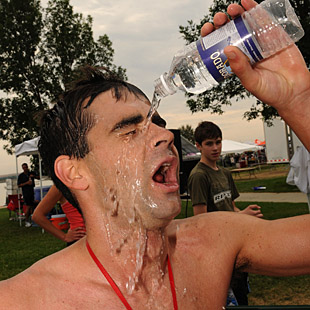
Leaving the Navy
ST: By the way, when did your obligation to the Navy end?
Timothy: I got out in December of ‘08. That year there was a lot of turbulence in my life. I was disappointed in myself the way I raced Trials. I don’t think it was indicative of how I could have done.
ST: Somewhere between 2008 and last year, you were very discouraged.
Timothy: The weekend after Des Moines, I flew to Korea and went to the Tongyeong World Cup. And that is where I grew discouraged about what I was doing. I remember on the run I completely gave up on the race. I was running 40 minutes or something. When I was running around one of the turnarounds I remember saying to myself: ‘You know what? I don’t need this. Go back to school.’
ST: What were you options?
Timothy: I was at a point where I wasn't quite sure what to do. Do I stay in the Navy? If I had stayed in the Navy, triathlon would have to be a side thing. I had to go back and do real Navy work. Do I do that? Or do I get an engineering job. Do I take the safe route? Do I get a job with a big firm with benefits? Do I go back to school and pursue other interests? Or do I stay in the sport?
ST: Some coaches might have said: ‘No. You have never showed us you can run 32.’ Your family might have counseled you to play it smart with your career?
Timothy: Yeah. At the end of ‘08, I didn’t have the results. My parents are pretty conservative. It isn’t that they didn’t want me to pursue a dream, but they wanted me to be secure. So to them it’s ‘Hey. You’re crazy. You are going to give up the Navy? Great benefits. You are not going to get fired. You are taken care of.’
ST: Did anyone else persuade you?
Timothy: In some ways, I had been very limited in my Navy career by what I had been doing. My department head in San Diego, Lt. Cmdr. Kevin Childre, a great athlete himself, had actually raced as a professional triathlete when he was younger. He was very candid with me. He said: ‘Tim, coming into a regular Navy career track now, you’ll be lucky to make Lt. Commander. You have to start where Ensigns are and you are a Lieutenant. It’s an uphill battle. I won’t say you can’t do it. But coming from a guy who had been in the sport, if I had your talent right now, and your options in the sport, I would stay in the sport.”
ST: It was still a leap of faith?
Timothy: Yes. Kevin still shoots me emails. After my win at Worlds in 2009 he was happy. Part of it wasn’t just taking a leap. I had a very unique Navy career and a lot of people don’t think it was very traditional. It wasn’t a cookie cutter career. Some people thought that I took advantage of the privilege afforded by my sports success. It’s true I had a great deal. Some people got jealous and some people thought it was a great idea. Part of me thought maybe I should stay in and do some of the normal Navy stuff. But now I see that Navy athletes serve a purpose. You can see it with the Navy’s presence in Kona and their presence at the X Games. They need to market the service and athletes are the kind of people they need to help them do it. So I provided a value and people running the Navy with a lot more authority than I were the ones that said we need to do this. And I didn’t tell the Navy this was going to be my career. I served five years and the Navy told me we would like to see you do this because it was going to be beneficial for everybody. At the end of the day I was able to come to peace with my decision to leave and took the plunge as a professional athlete.
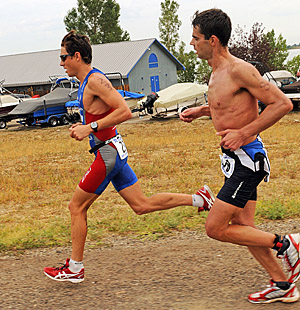
The next level
ST: Something magical happened between December of 2008 and the first months of 2009. What started you to the next level?
Timothy: At the end of ‘08, I had a very serious girlfriend. We had been together for five years. We started dating in high school and we broke up. Then we started dating again when I graduated from the Academy. So when I was looking at my options, I was contemplating moving to join her in Jacksonville, Florida where she lived. She was a lawyer. And Jacksonville was a horrible place to train. Flat. Hot. Nobody to train with.
I had a lot of pressure from her to go the traditional career route. We had reached a point where we have to start a life together or else it’s not going to be. I thought where does triathlon fit into that? None of it fit very well. So we broke up at the end of the year.
ST: Did that decision help you decide to commit to triathlon?
Timothy: Yes. Then I was OK. In my mind I was committed. I’m no longer in the Navy. I’m going to be a triathlete. I’m going to make a career out of this. Then the question became: How am I going to do this? What I was making before wouldn’t pay the rent. So Matt and Kelly Reed said, ‘Hey TO! Come and check out Boulder. It’s pretty cool.’ That December I came up and stayed with the Reeds a couple days. I thought ‘There is something natural here for me.’ As much as I loved the Olympic Training Center in Colorado Springs, it’s a great stepping stone. But I think you can get complacent there. If you have a bad race, you can come back and still get your massage. Still get your meals. Chances are somebody else there did badly too. So there is some comfort in that. It’s great for the younger guys who can’t support the lifestyle. But a guy like myself, at 28, it was time to go and make a career out of this.
So I packed up all my stuff and drove my Volvo 1700 miles from my parents’ place in Wilkes-Barre, Pennsylvania to Boulder. I found a place in three days. I thought, ‘All right. I can probably do this on my savings for two years.’ Luckily, I didn’t have to burn it all.
ST: How did you raise your game?
Timothy: I was still working with Cliff English. We started really seeing progress on my run at the beginning of ’08 thanks to group training sessions with Brian Fleischmann and Joe Umphenour, guys I don't normally run with. I did an ITU race in Hong Kong the week after Clearwater in ‘08. And while I dropped my chain and lost the front pack and came off with the second pack, I had a great run. At the end of the year I began to think I can run. I think I can do this.
So I buckled down in Boulder and had a serious training block. Did some awesome sessions with Matt Reed and I ran with my good buddy James Carney and another friend of mine, Ryan Padilla, who had run at Dartmouth. Ryan is a great runner and he became my training buddy and we were doing some unbelievable sessions out at the Boulder Res. I was getting confident running with real runners, people I thought were better than me.
ST: What was the tipping point?
Timothy: At first I didn’t feel like I belonged with the real runners. Then we went a one tempo run one day and I popped him. From that point I thought: ‘Yes! This is it!’
ST: Midway through 2008 you were leading but got run down in the final mile at Buffalo Springs Lake and at the Boulder 5430 long course. Were you devastated or encouraged?
Timothy: I was upset. Number one, if I had known how to win, I think I could have won at least one of those. When I crossed the line at Buffalo Springs, I literally couldn’t stand up. I gave everything I possibly could in that that race. I would have loved to have won. But I came to grips with myself, I realized I raced as well as I possibly could. So there is satisfaction in that even if you don't win. But 5430 was pretty devastating.
ST: How did that race in Boulder end up for you?
Timothy: I was coming across the Res on the dam with about 2.5 miles to go and nobody was in sight. I was hurting and I see Crowie coming by on a bike. I’m thinking: ‘Crowie is going to go tell whoever is behind me that I am hurting really bad. And sure enough, I heard later he said to Simon Thompson: ‘Oh, he’s hurting! You can catch him.’ To that point, Simon hadn't thought he could catch me. So he tells Crowie, ‘Oh, OK,’ and starts running hard.
ST: Simon Thompson was a 2004 Olympian and when he is on he is very fast. You had a fabulous 2:04:47 bike and a solid 1:19:10 run at Boulder in 2008. But Simon ran 1:11:59 and erased your 7-minute lead and beat you to the line by 33 seconds.
Timothy: Simon’s run on that course was phenomenal. But in 2009 the next year, I ran four minutes faster than I had in 2008 – 1:15:16. And when I crossed the line, instead of collapsing I felt fine and had a 6-minute lead.
ST: And you set a course record of 3:45:51.


